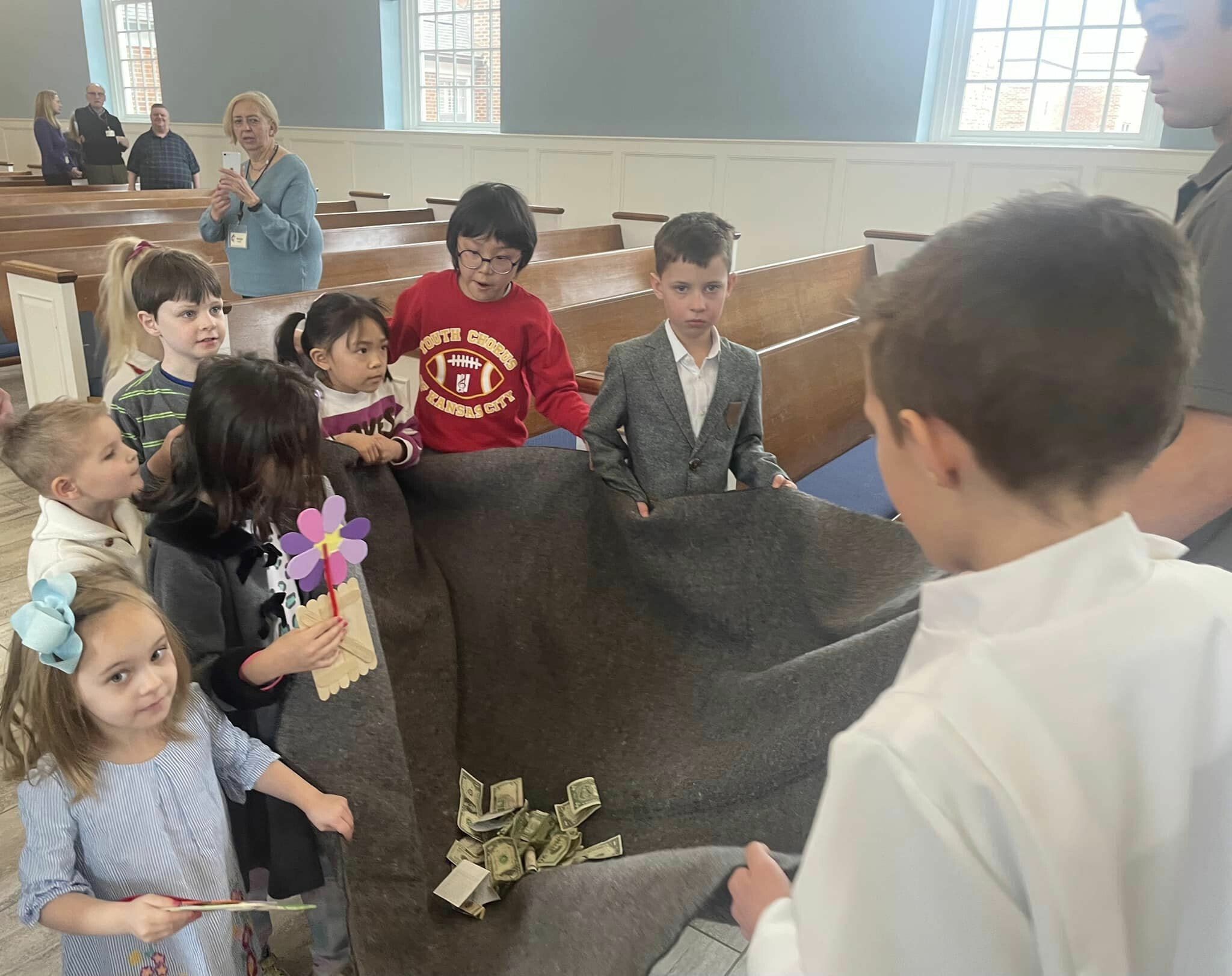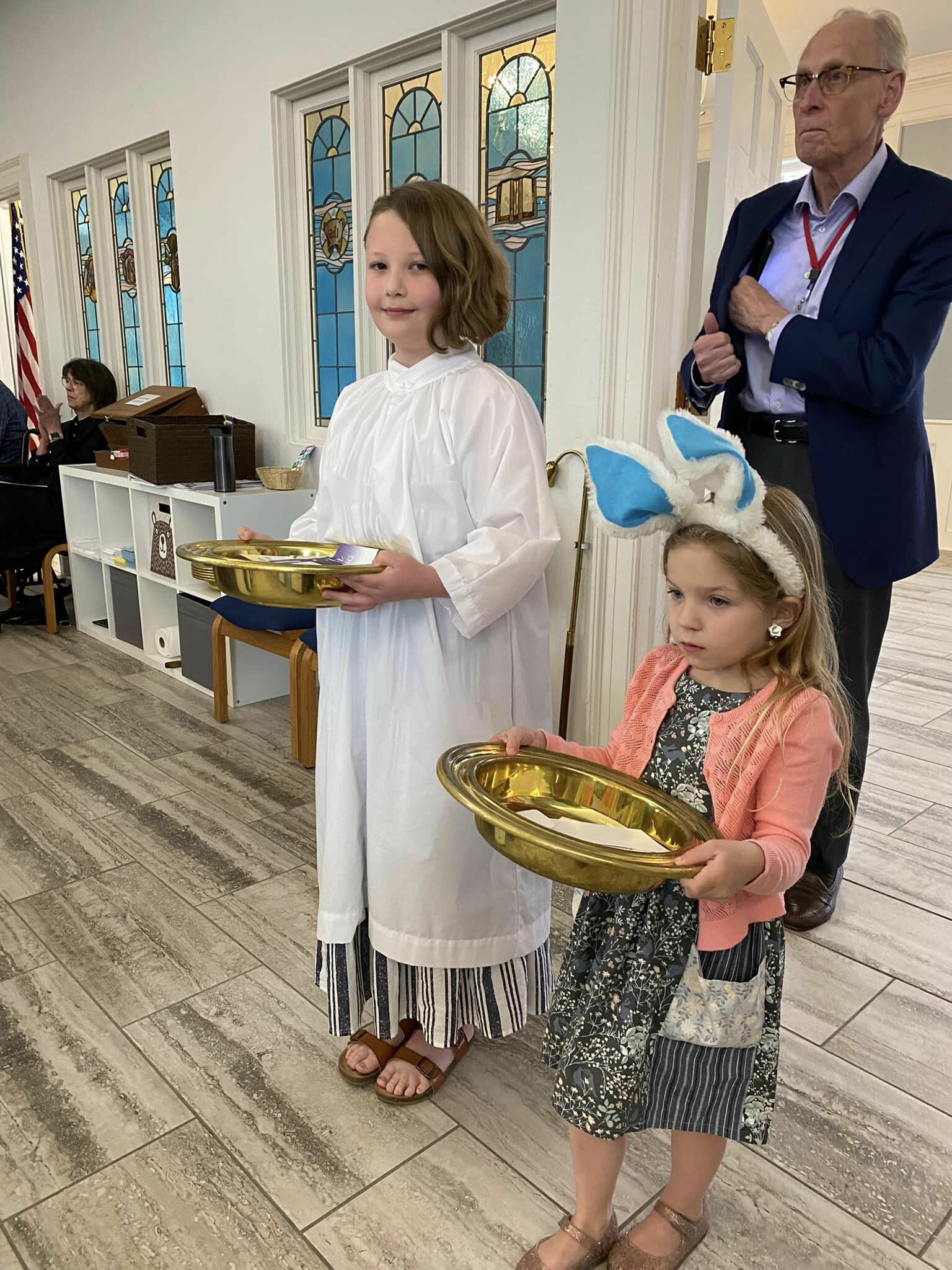All Manner of Good
"Each of you must give as you have made up your mind, not reluctantly or under compulsion, for God loves a cheerful giver. And God is able to provide you with every blessing in abundance, so that by always having enough of everything, you may share abundantly in every good work." - 2 Corinthians 9:7-8
One of the fundamental beliefs of Christianity is that all things come from God. John Wesley, founder of the Methodist Church, concluded that even our money is a gift, and should not be hoarded or squandered, but used for "all manner of good." Giving is a reflection of your faith and an expression of worship that leads to a deeper, more loving relationship with God. How we steward our money helps shape and direct our heart.
Why Do We Give?

Giving and the Faithful Way
Giving is a response to God's goodness.
Every generous act of giving, with every perfect gift, is from above, coming down from the Father of lights, with whom there is no variation of shadow due to change. - James 1:17
God is our source of security.
But strive first for the kingdom of God and his righteousness, and all these things will be given to you as well. - Matthew 6:33
God cares about economic justice.
The Spirit of the Lord is upon me, because he has anointed me to bring good news to the poor. He has sent me to proclaim release to the captives and recovery of sight to the blind, to let the oppressed go free. - Luke 4:18
Giving is a way we can bless others and be blessed.
I will make of you a great nation, and I will bless you, and make your name great, so that you will be a blessing. I will bless those who bless you, and the one who curses you I will curse; and in you all the families of the earth shall be blessed. - Genesis 12:2-3

More Ways to Give
Your generosity towards Asbury's operating budget makes ministry here possible. But that's not the only opportunity to make a difference! Learn how to plug into ministry at Asbury by clicking on the "How to Serve" button below.
Planned Giving
Tabs
- What is Planned Giving?
- What is an Endowment Fund?
- Endowed Funds at Asbury
- Types of Charitable Gifts
- Click Here to Learn More
Planned giving, also known as legacy giving, is the process of making a charitable gift during a donor's life or at death that is part of their financial or estate plan. Planned giving comes in many forms, including bequests, trusts, retirement assets, insurance, or other financial instruments. Gift planning can be complicated and donors should seek qualified help in creating their plan.
Planned giving isn't just about money - it's about impact. When you include Asbury in your estate planning, you're investing in the future mission and ministries of the church. A planned gift allows Asbury to plan long-term projects, support ongoing initiatives, and create sustainable change in communities.
The Asbury Endowment Fund was established to provide a means for Church members and others to make gifts and bequests as living memorials to their faith and to honor individuals in order to provide long term financial support to the Church. All gifts made to the endowment fund will be held in perpetuity unless otherwise designated by the donor. The endowment fund is used to assist the Church in fulfilling its purposes in Christian ministry and mission.
Within the Asbury Endowment Fund there are two categories of funds, General and Donor Restricted.
The General Fund consists of five subsidiary funds each of which include a range of activities that fall within a broader ministry:
- Mercy & Justice: Income from this fund shall be used to support local, national or global mission programs and projects. This fund will also support justice ministries focused on healing inequality, encouraging inclusion, promoting diversity and eliminating bias.
- Christian Education, Nurture & Faith Development: Income from this fund shall be used to advance and promote education, discipleship, lay leadership, physical well-being and mental health.
- Worship and Related Arts: Income from this fund shall be used to enhance the worship experience by paying for and maintaining musical instruments and accessories, choir robes, copyrighted music, special programs and artists.
- Building: Income from this fund shall provide for capital improvements, major repairs, preventive maintenance, sustainable energy projects, equipment, furnishings and decor for any properties owned by the Church.
- Unrestricted Fund: This fund will receive gifts and bequests, which are not designated for a particular purpose or restricted in any way. This fund has the most flexibility because income can be used to support any ministry or mission selected by church leaders.
Donor Restricted funds can only be used for projects or purposes specified by the donor. The funds can be restricted because the donor wants the money to go to a specific program or the donor wants the money to be utilized after a specific time or event.
The Asbury Endowment Fund has fourteen Donor Restricted Funds. Most of these funds have been given as memorials. Ministries supported by these funds include: Scout Troop 299, children and youth programing, education scholarships, Asbury Children’s Center, UMCOR, and speaker events.
To create greater impact, any new Restricted Fund can be established with an initial gift of $50,000 or greater. To learn more about supporting these additional funds or if you would like to create a new donor-restricted fund, please reach out to the Development Director at the church office.
There are many different ways for a donor to contribute to a church endowment fund. Each type of charitable gift is unique in what it does, the tax advantages it offers, and the most appropriate time to use it. The following lists the most popular ways to contribute to an endowment fund and some advantages of each. For more detailed information on giving options, talk to your financial advisor, accountant, or estate attorney.
A Direct Gift is when a donor gives an asset, such as cash, stock or real estate, directly to the endowment fund. All potential donors can use this method. Cash contributions are eligible for an income tax deduction. Gifts of an appreciated long-term capital asset, such as stock, are eligible for an income tax deduction and will avoid capital gains taxes on the asset’s appreciation. A donor must itemize their deductions to receive a charitable income tax deduction.
A Bequest is when someone gives assets, such as stocks, bonds and personal property, through their will or trust. Including a charitable bequest to the Asbury Endowment Fund is a great and easy way to provide long-term support for the church. The value of the gift is removed from a person’s estate, which reduces the amount owed in estate taxes. Charitable bequests also provide flexibility because they are revocable and can be changed at any time. Below is a list of different bequest types:
- Percentage Bequest: You may direct that the Endowment Fund Foundation receive a percentage of your estate or residuary estate. In this case, if the size of your estate changes, the bequest will change proportionately.
- General Bequest: With this type of bequest, you simply leave a specified dollar amount to the Endowment Fund.
- Specific Bequest: A bequest of this type involves the designation of specific property (e.g., a home, a farm, or shares of stock) that you want the Endowment Fund to receive.
- Residuary Bequest: Through a residuary bequest, the Endowment Fund will receive the remainder of your estate after all liabilities and other bequests have been paid.
- Contingent Bequest: It is important to anticipate a situation in which a beneficiary might die before you or choose to disclaim the property. To prepare for such an occurrence, consider naming the Asbury Endowment Fund as the contingent beneficiary.
Name the Asbury Endowment Fund as a Designated Beneficiary of Qualified Assets (401(k), IRA, etc.). As a non-profit, the church is not required to pay taxes and the donor’s estate receives a tax deduction upon the donor’s death. Naming an individual as the beneficiary will expose the asset to income taxes, and estate taxes depending upon their net worth. These taxes can greatly reduce the amount the beneficiaries actually receive.
Donors can use Life Insurance to make a charitable donation in a number of ways:
- Designate the endowment fund as the beneficiary of a life insurance contract they continue to own.
- Transfer their ownership of a life insurance contract to the endowment fund. Or, purchase a new contract and name the church as owner and beneficiary. Premium payments may be tax deductible.
- Cash out a current policy and give the proceeds to the church. Surrendering a policy for its cash value will trigger ordinary income taxes on the policy’s appreciation.

